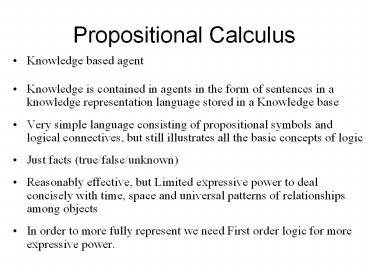Propositional Calculus - PowerPoint PPT Presentation
Title:
Propositional Calculus
Description:
Knowledge is contained in agents in the form of sentences in a knowledge ... 6. 'Every person who dislikes all vegetarians is smart. ... – PowerPoint PPT presentation
Number of Views:53
Avg rating:3.0/5.0
Title: Propositional Calculus
1
Propositional Calculus
- Knowledge based agent
- Knowledge is contained in agents in the form of
sentences in a knowledge representation language
stored in a Knowledge base - Very simple language consisting of propositional
symbols and logical connectives, but still
illustrates all the basic concepts of logic - Just facts (true/false/unknown)
- Reasonably effective, but Limited expressive
power to deal concisely with time, space and
universal patterns of relationships among objects - In order to more fully represent we need First
order logic for more expressive power.
2
COMP-4640 Intelligent Interactive SystemsThe
Predicate CalculusFirst Order Logic
- FOL or FOPC (true/false/unknown)
- More than just facts, objects relations
- We notice that the world is blessed with many
objects, some of which are related to other
objects, and we endeavor to reason about them
3
COMP-4640 Intelligent Interactive SystemsThe
Predicate Calculus
4
COMP-4640 Intelligent Interactive SystemsThe
Predicate Calculus
5
COMP-4640 Intelligent Interactive SystemsThe
Predicate Calculus
Language and Syntax The predicate calculus is
composed of the following components -Object
Constants ( A, 112, SmallBlock, etc.)
-Function Constants (queen_of1, height_of1,
mltpy2, etc.) -Relation Constants (K253,
Married_to2, etc.) -Logical Connectives and
Delimiters (?, ?, ?, ?, ?, ?, ?, ?)
6
COMP-4640 Intelligent Interactive SystemsThe
Predicate Calculus
Terms Any object constant or function constant
(with N terms in parentheses where N is the arity
of the function) is a term. Ex
queen_of(England), mltpy(5,4). All Predicates
have an arity, i.e., a fixed number of
arguments.
7
COMP-4640 Intelligent Interactive SystemsThe
Predicate Calculus
Sentences (well formed formulas) Atoms are
relational constants (with the appropriate number
of arguments in parentheses) Ex.
Married(Gerry,Jacqui). plus(two, three).
likes(George, Kate).
likes(George, X). likes(George, Suzie).
helps(richard, bill).
friends(bill, george). brothers(bill, john).
-If w1 and w2 are sentences then so are w1 ? w2
(disjunction) w1 ? w2 (conjunction) w1
? w2 (implication) ?w1
(negation) Logical combinations Ex.
Married(Gerry,Jacqui) ? Loves(Gerry,Jacqui) Brot
hers(bill, john) ?
brothers(x,y) brothers(y,x)
brothers(Pat, Sue)
8
COMP-4640 Intelligent Interactive SystemsThe
Predicate Calculus
- Semantics
- A world can be composed of an infinite number of
objects (individuals) - An interpretation of an expression is a mapping
between object, function, and relation constants
in predicate calculus to objects, functions, and
relations in the real world. - A particular mapping or assignment of an
interpretation is called a denotation.
9
COMP-4640 Intelligent Interactive SystemsThe
Predicate Calculus
Models An interpretation satisfies a set of
sentences if each of the sentences evaluates to
true given the interpretation. A model is an
interpretation that satisfies a set of
sentences. Valid sentences are true under all
interpretations. Any sentence that does not have
a model is said to be inconsistent or
unstatisfiable. If a sentence, s, is true under
all interpretations for which each sentence in ?
is true then ? ? s (logical entailment).
10
COMP-4640 Intelligent Interactive SystemsThe
Predicate Calculus
- Knowledge
- Sentences written in FOPL can be used to
represent knowledge (in the form of facts and
rules) about the world. - Socrates is a man
- Richard is the brother of John
- Dave is married to Julie
- Richards father is married to Johns mother
11
COMP-4640 Intelligent Interactive SystemsThe
Predicate Calculus
- Knowledge
- Sentences written in FOPL can be used to
represent knowledge (in the form of facts and
rules) about the world. - Socrates is a man
- man(socrates).
- Richard is the brother of John
- brother(richard, john)
- Dave is married to Julie
- Married (dave, julie)
- Richards father is married to Johns mother
- Married (father(richard), mother(john)
12
COMP-4640 Intelligent Interactive SystemsThe
Predicate Calculus
- Quantification
- It is only natural to want to express properties
of entire collections of objects, - instead of enumerating the objects by name. We
need them to help with interpretation. - There are two types of quantification in FOPL
- Universal (For all x)
- ?x (Kid(x) ? likes(x,Candy))
- 2. Existential (There exists an x)
- ?x (Kid(x) ? likes(x,Broccoli))
13
(No Transcript)
14
(No Transcript)
15
(No Transcript)
16
(No Transcript)
17
COMP-4640 Intelligent Interactive SystemsThe
Predicate Calculus
- Quantification (cont.)
- Some useful equivalences (based on DeMorgans
Law) are - ??z (w(z)) ? ?z (?w(z))
- ??y (q(y)) ? ?y (?q(y))
18
(No Transcript)
19
COMP-4640 Intelligent Interactive SystemsThe
Predicate Calculus
- Some Practice Problems
- Everybody loves someone.
- 2. There is someone who is loved by everybody.
- 3. There is someone who loves everybody.
- 4. Everybody has someone who loves them.
20
COMP-4640 Intelligent Interactive SystemsThe
Predicate Calculus
Some Practice Problems (cont.) 5. Not all
students take both History and Biology.
6. Every person who dislikes all vegetarians
is smart.
21
(No Transcript)
22
(No Transcript)
23
(No Transcript)































